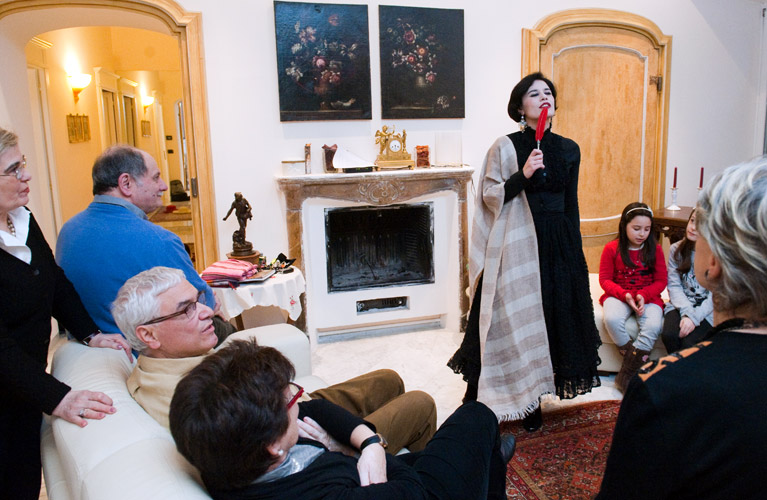








Your Custom Text Here
Year: 2010/ 2011
Lenght: 60 min
This project includes two different works, Ouija and The Game of the Princess, the first of which went on to become an actual production while the second remained in the version of the staged reading.
The two works were created as part of the events celebrating the 150th anniversary of the Unification of Italy in 2011.
Ouija is a spiritualistic séance, performed live by an actress, using Apple’s GarageBand technology for the synthesis of different voices. The play is inspired by the amorous correspondence between the Count Camillo Benso di Cavour and his first lover, Anna Schiaffino Giustiniani, called Nina (published in Letters of Love by Maria Avetta), who committed suicide in 1841. It is a story of love, death and power in the context of the Italian struggle for Unification.
The Game of the Princess is a drama based on biographical, iconographic and historical documents about the extraordinary life of Cristina di Belgiojoso, a Milanese Countess with a multifaceted life. As a noblewoman with political aspirations, the Countess di Belgiojoso finds herself living through the key places and the decisive events of the Italian struggle for Unification: the Genoa of Mazzini, the Paris of Lafayette, the Revolution of ’48, the Milanese uprising (in which Countess di Belgiojoso led 200 Neapolitan volunteers to Rome), the tragic events of the Roman Republic and her exile to a remote village east of Ankara, which was connected with the life of the harem.
Year: 2010/ 2011
Lenght: 60 min
This project includes two different works, Ouija and The Game of the Princess, the first of which went on to become an actual production while the second remained in the version of the staged reading.
The two works were created as part of the events celebrating the 150th anniversary of the Unification of Italy in 2011.
Ouija is a spiritualistic séance, performed live by an actress, using Apple’s GarageBand technology for the synthesis of different voices. The play is inspired by the amorous correspondence between the Count Camillo Benso di Cavour and his first lover, Anna Schiaffino Giustiniani, called Nina (published in Letters of Love by Maria Avetta), who committed suicide in 1841. It is a story of love, death and power in the context of the Italian struggle for Unification.
The Game of the Princess is a drama based on biographical, iconographic and historical documents about the extraordinary life of Cristina di Belgiojoso, a Milanese Countess with a multifaceted life. As a noblewoman with political aspirations, the Countess di Belgiojoso finds herself living through the key places and the decisive events of the Italian struggle for Unification: the Genoa of Mazzini, the Paris of Lafayette, the Revolution of ’48, the Milanese uprising (in which Countess di Belgiojoso led 200 Neapolitan volunteers to Rome), the tragic events of the Roman Republic and her exile to a remote village east of Ankara, which was connected with the life of the harem.